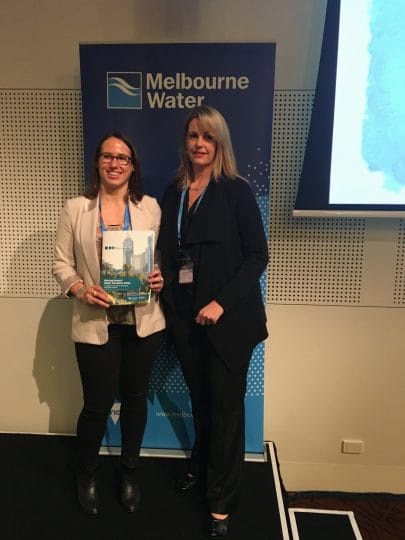Research highlights shared with water industry at OzWater’16
CRC for Water Sensitive Cities (CRCWSC) researchers and industry participants showcased some of the latest research findings and projects last week at Australia’s largest water industry conference Ozwater’16, presented by the Australian Water Association.
The conference stream on Liveable and Sustainable Cities of the Future saw good representation by the CRCWSC including by PhD candidate and researcher for Cities as water supply catchments – Society and institutions (Project A4.1), Lara Werbeloff. Her presentation generated positive discussion on developing a strategic water sensitive city transition plan and was an opportunity to launch the recent industry report ‘Moving toward Water Sensitive Cities: A guidance manual for strategists and policy makers’.
Lindsey Beck, lead researcher on Developing a Water Sensitive Cities Index (Project D6.2) shared recent developments with the audience on the project, along with Project Leader Chris Chesterfield giving workshop participants a more in-depth understanding of how the tool can be used to inform transition planning.

Victorian case studies were presented by industry participant Andrew Chapman from South East Water, who shared the podium with CRCWSC Chief Executive Professor Tony Wong to demonstrate how development site Fishermans Bend is transitioning to a water sensitive city. Dr Briony Rogers, project leader for Mapping water sensitive city scenarios (Project A4.2, delivered an update on the CRCWSC integrated case study project titled ‘An integrated approach to enhancing urban flood resilience in Elwood, Melbourne’.
ClimateWorks Australia and Melbourne Water Chair John Thwaites, who is also a leader researcher in Strategies for influencing the political dynamics of decision making (Project A3.3), delivered an inspiring opening address on the role of the water industry will play in achieving the United Nations’ Sustainable Development Goals.
“The first thing we need to determine is what impact the water industry have on each of the Sustainable Development Goals and then we need to look for synergies between the goals, and how what we can do in the water industry can achieve multiple goals across economic, social and environmental priorities,” he said.
“I think we have the opportunity to develop really deep relationships with many of our neighbours based on sustainable water management and good urban planning.”
We would also like to again congratulate Associate Professor Kelly Fielding and her team from the project on Engaging communities with water sensitive cities (Project A2.3) who was a finalist in the Australian Water Association’s Research Innovation Award.